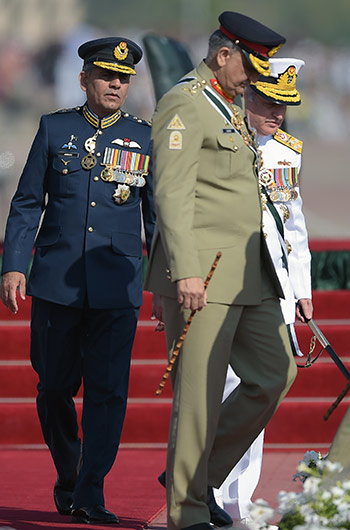
Source:AFP
Zafar Nawaz Jaspal
Global politics is fluid and dynamic.Nations are combating identical and contrasting traditional and non-traditional security challenges. Security analysts are calling a mix of these challenges as Hybrid Warfare. Clausewitz said, “every age has its own kind of war, its own limiting conditions, and its own peculiar preconceptions.” The changing characteristics of warfare or aggression certainly require a change in the prevalent national security approaches. Therefore, conceptualization and contextualization of hybrid warfare are imperative for avoiding doctrinal lags. Though, every nation has to chalk out strategies to counter hybrid warfare according to its own peculiar national security challenges, yet hybrid warfare is a difficult concept to grasp.
Hybrid warfare is a new entrant in the lexicon of warfare. It is a western terminology, which popularized after the annexation of Crimea by Russia in 2014. Russian analysts referred to it Gerasimov Doctrine or new generation warfare. Chinese called it an unrestrained war. Nowadays, security analysts have employed a plethora of terminologies such as asymmetrical, unconventional, non-linear, gray zone conflict, competition short of conflict, active measures, and new generation warfare to depict the range of current conflicts. Frank G. Hoffman argues, “the evolving character of conflict that we currently face is best characterized by convergence. This includes the convergence of the physical with the psychological, kinetic with non-kinetic and combatants with noncombatants. We also see the convergence of military force and the interagency community, states and non-state actors by the capabilities they are armed with.” This converging mode of battles is termed as Hybrid Warfare.
Hybrid warfare broadens the idea of conflict to include various elements of national power to impose aggressor’s will on its opponent(s) through integrated adaptive and asymmetric synchronized destructive effects on them in a multidimensional space and in various spheres of life. In it the primary focus is “taking control of society, influencing the mindsets of people and manipulating people who are responsible for making important decisions in a state.” The foe manipulates core values, motivational factors, cultural biases, ethnic dissimilarities, sectarian differences to spoil the strategic, communicational and critical infrastructure of a country.
Hybrid warfare is an effective tool to provoke asymmetrical warfare in a hostile country. Admittedly, asymmetric warfare strategy is the choice of a weaker actor and thereby logically weaker nations or actors adopt hybrid warfare strategies to avoid attribution and retribution. Militarily superior states are employing hybrid warfare strategies against their weaker opponents since total war as an instrument of state policy is becoming obsolete and less relevant. Resultantly, the probability of full-scale conventional war, especially between nuclear states is also gradually receding as an option for settling disputes.
Through hybrid warfare, one battlefield is created employing a combination of tactics and fusion of war forms simultaneously for example traditional, irregular, catastrophic terrorism and disruptive social behavior in addition to multiple other forms.
Technologically advanced nations are in an advantageous position in the realm of hybrid warfare. They can exploit non-attributable means like cyber, information warfare, surprise, deception, extensive use of proxy and Special Forces. In addition, they can use political sabotage, economic pressure, intelligence operations and special operations coupled with posturing of conventional forces if need be to exploit a wide range of options for a favorable outcome of the conflict.
Pakistan is poised to become the world’s top hybrid warfare battleground due to its pivotal role in China’s Belt Road Initiative. China-Pakistan Economic Corridor and emergence of Gwadar seaport frustrates its adversaries. The opponents of Pakistan are hatching conspiracies and operating below the threshold of conventional warfare, through a blend of military and paramilitary tools using radicalized militants and ethnic separatists, cyber tools, and information operations as proxies to coerce, destabilize and shape its policies to their advantage. Islamabad is cognizant of this form of threat and is struggling to thwart risks emanating from hybrid warfare. However, there can never be sufficient countermeasures to successfully deal with this form of warfare.
In this uncertain and dynamic world, Pakistan’s ability to protect its core values would arise from its competence to defend its integrity and interests against present and future threats. Though hybrid warfare is a military strategy that blends conventional warfare, asymmetric warfare, irregular warfare, offset warfare, non-linear warfare, and cyber warfare, yet in a crisis it is not only the armed forces that have to respond in a unified manner but the entire nation, government and all its organs, media and the people who must respond in an integrated fashion. For galvanizing the non-military sections of the society, it seems appropriate to establish the Hybrid Warfare Stratagem Center (HWSC). It will assist in building up the capability to enable Pakistani policymakers to better understand the hybrid threat phenomenon, develop metrics to get a grip on events, systematically address vulnerabilities, and contemplate how hybrid threats might develop in the future.
Defensive apparatus against the hybrid warfare onslaught ought to include both kinetic and non-kinetic fences. The non-kinetic defensive mechanism must be based on the humane and people-centric approach. It upholds the laws of the land and ensures Human Rights. Nonetheless, in unavoidable contingencies, law enforcement agencies can use minimum kinetic means without causing any collateral damage. Without any hold, law enforcement agencies use overwhelming force against foreign and hardcore terrorists.
Against a highly sophisticated, hybrid warfare strategy perpetrated against the Pakistani state and society, national security policymakers need to chalk out a comprehensive counter-strategy. This comprehensive counter-strategy should include private sector businesses, all government agencies, the military and academia to confront hybrid warfare unleashed against Pakistan.
Dr. Zafar Nawaz Jaspal is an Associate Professor at the School of Politics and International Relations at Quaid-i-Azam University, Islamabad.




